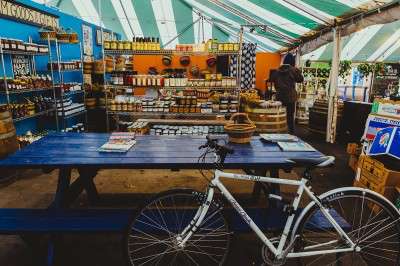
While both in support of sustainable food efforts, Boston University Dining Services and student group Real Food Challenge advocate for different rating systems to evaluate these sustainable efforts.
BU Dining uses the Association for the Advancement of Sustainability in Higher Education and Sustainability Tracking, Assessment and Rating System to measure their sustainability performance, said Sabrina Pashtan, the sustainability coordinator for BU Dining from Sustainability@BU.
“When it comes to food, the University has committed to purchasing 20 percent sustainable food by 2018, the standards of which are set by AASHE STARS,” she said. “We buy a lot of organic food, and we try to buy as much locally-grown, raised and caught food as possible.
Using the AASHE STARS system allows colleges and universities to gain recognition for sustainability efforts, inform through strategic planning and budgeting and create goals for continuous improvement, according to ASSHE STAR’s website.
Real Food Challenge, a student group on campus dedicated to food sustainability standards, calls for student researcher-led reporting and access to information, said Laura Kakalecz, founder of the group.
“Student organizers with Real Food Challenge call for a greater level of institutional accountability and transparency and student voice in decision making, while recognizing the support and strength that comes from being part of a national youth movement,” said Kakalecz, a senior in the College of Arts and Sciences.
RFC supports the use of the Real Food Calculator, which is also a way to track sustainable purchases, Kakalecz said. The group is a partner with ASSHE STARS, but the food calculator has not been used at BU.
“Boston University administration has said ‘No’ to working with Real Food Challenge and committed to working with AASHE STARS, a self-reporting system on sustainable purchasing,” Kaklecz said.
The group has been attempting to reach BU President Robert Brown to talk about using the calculator, she said.
BU hosted a monthly Boston-area meeting with representatives from Suffolk University, Harvard University and Northeastern University Sunday at the Center for Gender, Sexuality and Activism to examine how to address sustainable dining practices at their institutions.
Drew Love, northeast assistant coordinator for the RFC, said the main flaw of reliance on AASHE ratings is its lack of third-party review.
“One of the key differences between AASHE and the Real Food Challenge is that for AASHE, a lot of it contains self-reporting,” he said. “The Real Food Challenge actually has students and a third party reviewing the invoices.”
Love said BU might not be using the calculator because they are satisfied with the ASSHE STARS system.
“Most of the time, BU dining halls review their records, submit their review to AASHE, then AASHE tells them essentially how sustainable they are,” he said. “It really doesn’t have that third-party objective review in the same way that the Real Food Challenge calculator does.”
Several students said despite what rating system the school uses, they support efforts on campus to have more sustainable dining.
Ja’nae Stewart, a junior in the School of Management, said efforts by BU Dining and student groups like RFC show responsibility and care about the environment.
“Sustainable dining at BU is great because they are being socially conscious, and they’re aware of their impact on the environment,” Stewart said. “It helps students become aware as well.”
Femke Hermse, a freshman in CAS, said more people should be aware of efforts going on around campus to support sustainable dining and food.
“I don’t think we support local farms enough though,” she said. “When do you see in the dining halls support for local farms? Even the vegetables and salads are local but most people don’t know because nobody reads the cards.”
Xavier Bohorquez, a freshman in CAS, said given the high volume of food necessary to feed students, it is important for college dining halls to be aware how serve food in the most environmentally friendly way.
“Here, you are providing for and assisting so many students, thousands, so being environmentally friendly is very important because there are so many people here,” he said. “The choices you make on how you affect the environment by the foods you get make a much bigger impact here than really anywhere else.”












































































































